
Henry Thomas Stanley
1. Henry Thomas Stanley was born on 20 Aug 1873 (son of Edward James Stanley and Mary Dorothy Labouchere); died on 16 Sep 1900. Notes:
--- "Nottingham Journal" 19 Sep 1900, page 6:
REPORTED DEATH OF A POPULAR CRICKETER.
Much consternation was aroused in Bridgewater yesterday when it became known that Lord Roberts had announced that Lieutenant H.T. Stanley, of the Imperial Yeomanry, had been killed in a skirmish with the Boers at Hexport, it being feared that the gallant officer is the son of Mr. E. J. Stanley, the member for Bridgewater Division, and a popular cricketer for Somerset County.
--- "Evening Star" 20 Sep 1900, page 2:
Lieutenant H.T. Stanley, of the Imperial Yeomanry, a son of Mr. E.J. Stanley, M.P., and grandson of Lord Taunton, who is reported as killed in action under General Clements's command, was a very steady cricketer. He never was given his "blue" for Oxford, but was frequently tried in the preliminary matches. Perhaps his best cricket was shewn when playing for Somerset, for whome he scored 127 last year against Gloucestershire.
In Somerset he was extemely popular, and his cricketing parties at his father's place at Quantock Lodge will be pleasantly remembered by man. Mr. STanley, who is the member for the Bridgwater Division of Somerset, will recieve every sympathy from cricketers on the loss of his son. Lieutenant Stanley joined the West Somerset Yeomanry Cavalry in January, 1897, and was commissioned in the Imperial Yeomanry last February, serving in the 7th Battalion.
--- "Gloucestershire Echo" 19 Sep 1900, page 3:
Cricketers will receive with regret the news from South Africa, to hand yesterday, of the death in action of Mr. H.T. Stanley. Without ever taking a very high place, Mr. Stanley was a good batsman of the safe, steady school, and at various times did useful work for Somerset. Last year, though he scored only 367 runs in a dozen county matches, he played an innings of 127 against Gloucestershire on the Gloucester ground, going in first and staying till the score was up to 400. This was his first and only hundred in the county cricket. The deceased gentleman was the only son of Mr. E. J. Stanley, M.P. for the Bridgwater Division, and he went to the front with the West Somerset Yeomanry.
--- "A Yeoman's Letters" by P.T. Ross, 1901:
Death of Lieutenant Stanley.
Monday, September 17th. There is a funeral to-day-an officer's-and we (the Composite Squadron) are stopping in camp for it, as it concerns us. So I will tell you all about it. Yesterday was Sunday, seldom a day of rest out here. We, the three squadrons of Yeomanry attached to Clements' force, were sent out early on a reconnaissance. Without any opposition we advanced in a westerly direction towards Boschfontein, almost the same way as on Monday last, for about four miles, the Devon and Dorset troops of our squadron being on the right, our Sussex troop on the left, the Roughriders (72nd I.Y.) in reserve, and the Fife Light Horse scouting ahead. The Fifes had reached the foot of a high grass-covered kopje, and were about to ascend it, when the enemy opened a hot fire on them, causing them to scoot for their lives, which they managed to do successfully. We then galloped up, dismounted, and opened fire on the hill-top, the Devons and Dorsets doing the same on our right, and the Fifes falling back on our left. Where the Roughs were we never knew, probably their officers did. Taking into account the absence of the Nos. 3, with the led horses, and one group of our troop being sent some distance to the left, we only numbered six and our officer, Mr. Stanley, well-known in the cricket world as a Somerset county man. Our led horses were in a donga in the rear. The position we occupied, I should mention, was at the base of a kopje opposite to that held by the Boers. We were sighting at 2,000, when our captain, Sir Elliot Lees, rode up and said he could not make out where the Devons and Dorsets who should have been on our right, were. As a matter of fact they had retired unknown to us. This the wily Boers had seen and quickly taken advantage of, for Sergeant-Major Cave, of the Dorsets, rushing up to us crouching down, told us to fire to our right front, where some trees were about three or four hundred yards away, and from which a heavy fire was being directed at us. Sir Elliot Lees then came up again from our left. Mr. Stanley, seeing the hot corner we were in, retired us about a dozen yards back to the deepest part of the donga, where our led horses were, and ordered the fellows with the horses to retire, and later, gave the command for us to do the same in rushes by threes. Meanwhile our bandoliers were nearly empty, and the Boers were creeping round to our right, which would enable them to enfilade our position. The first three retired, and we were blazing away to cover them, with our heads just showing as we fired over the top of the donga, when the man on my right said, "Mr. Stanley is hit," and looking at him, for he was close to me on my left, I saw he was shot through the head, the blood pouring down his face. Sir Elliot, the other man, and myself were the only ones left in the donga then, so the captain, taking hold of poor Stanley by his shoulders, and I his legs, we started to carry him off. As we picked him up, he insisted, in a voice like that of a drunken man, on somebody bringing his carbine and hat. "Where's my rifle an' hat? Rifle an' hat!" The third man took them and gat-I heard this later. You have no idea what a weight a mortally-wounded man is, and the poor fellow was in reality rather lightly built. On we went, stumbling over stones, a ditch, and into little chasms in the earth. Once or twice he mumbled, "Not so fast, not so fast!" The bullets buzzed, whistled, and hummed by us, missing us by yards, feet, and inches, knocking up the dust and hitting the stones and thorn bushes we staggered through. We, of course, presented a big mark for the Boers, and were not under any covering fire so far as I am aware. The captain, who is grit all through, soon found it impossible to carry the poor fellow by the shoulders, the weight being too much for him, so I offered, and we changed places, Sir Elliot taking his legs and on we went, pausing, exhausted, perspiring and breathless, now and again, for a rest. At last, turning to our left, we reached a little bit of cover, thanks to a friendly rise in the ground, and falling into a kind of deep rut with Stanley's body on top of me, I waited while the captain went to see if he could get any assistance. Presently he returned with a Somerset man; and a minute or so later a Fife fellow, a medical student, came up. The former and I then got him on a little farther. After a few minutes' deliberation, the captain said, reluctantly, "we must leave him." We all three asked permission to stay. To which Sir Elliot replied, "I don't want to lose an officer and three men. Come away, men!" We then moved the poor fellow into a cutting about two feet deep and three feet wide, and arranged a haversack under his head. As we loitered, each unwilling to leave him first, Sir Elliot thundered at us to come on, saying, "I don't know why it is, but a Yeoman never will obey an order till you've sworn at him." Then reluctantly we set off in single file, working our way back by the bank of a stream, and still under cover of the rise in the ground, a little way up which we found one of our Sussex men, with his horse bogged to the neck. Further on we paused a moment, and the Fife man, saying that he thought the wound was not mortal, suggested that it would be well for somebody to be with Stanley so as to prevent him from rolling on it, and then asked permission to return. My Fife friend had not seen what I had. He had only seen where the bullet went in, not where it came out. Seeing that the captain was about to give him permission, I said "Mr. Stanley is my officer, sir, and I have the right to go," and he let me. I gave one my almost-empty bandolier, and another my haversack, telling him it contained three letters for the post, and-if necessary, to post them. My rifle I had already thrown into a ditch at Sir Elliot's command. Then I worked my way back, hoping that I should not be shot before reaching him. I got there all right, and evidently unseen; lying down by him, I arranged my hat so as to keep the sun off his face, and cutting off part of my left shirt-sleeve, with the water from my bottle, used half of it to bathe his temples and wipe his bubbling, half-open mouth. The other I moistened, and laid over the wound. He was quite unconscious, of course, and his case hopeless. Once I thought he was gone, but was mistaken. The second time, however, there was no mistake.
I waited by the brave man-who had been our troop leader for the last fortnight, and who had, I am sure, never known fear-for some time deliberating what to do. Shots were still being fired from somewhere in my vicinity, while our firing I had gloomily noted had receded, and finally ceased. By-and-bye, all was silent, then a bird came and chirped near me and a butterfly flitted by. At length, as it appeared to me useless to wait by a dead man, I determined to get back to camp, if possible, instead of waiting to be either shot in cold blood, or made a prisoner. After carefully going through all his pockets, from which I took his purse, watch, whistle, pipe, pouch, and notebook, and, attaching his glasses to my belt, having arranged him a little and laid my bloody handkerchief over his face, I got up, and worked my way along by the river bank till compelled to go into the open. I trusted to a great extent to my khaki on the dry grass, and daresay it saved me from making much of a mark; but spotted I was, and from the right and left the bullets came very thick and unpleasantly close. For about a mile I was hunted on the right and left like a rabbit. At first I ran a little, but was done, and soon dropped into a staggering walk. After a while I came on Dr. Welford and his orderly behind some rocks, just coming out, but when he heard my news he turned back, and, as I refused to use his horse, which he offered me, at my request rode off, and got potted at a good deal. Further on, he waited for me. He is a brick, our doctor; and when he learnt I was thirsty, and he saw my tired condition (the sun on my bare head had been most unpleasant) he offered me a drop of whisky and water, adding, "You'd better have it when we get round the bend of the kopje ahead." I thanked him, and said I thought it would be more enjoyable there. Enjoy it I did. Finally I reached the camp and told the captain the sad news, at the same time handing in the gallant officer's belongings. His watch was at 12.5 when I left him. Sir Elliot was most kind to me, and said I had acted gallantly, and he had told the major (commanding us). Then Major Browne came up, and he was also very complimentary. Of course, there was nothing in what I had done that any other man would not have done, and I told them so, especially as the example set by the captain made it impossible for a man to be other than cool. Lieutenant Stanley, who took command of us when we left Pretoria a fortnight ago, had soon become very popular, for he was a thorough sportsman, keen as mustard, quite unaffected and absolutely fearless. I feel pleased with myself for taking everything off the poor fellow before I left him; for when, late last night, the ambulance came in with him, the doctor's orderly told me that they found him stripped of his boots, gaiters, and spurs-which was all that were left worth taking.
His Burial.
"And far and wide,
They have done and died,
By donga, and veldt, and kloof,
And the lonely grave
Of the honored brave,
Is a proof-if we need a proof."
E. Wallace.
Tuesday, September 18th. We buried Lieut. Stanley yesterday at mid-day, the sergeants acting as bearers, we Sussex men (of the dozen of us, two were with him at Eton and one at Oxford) composed the firing party, while the whole squadron, officers and men followed. About three-quarters of a mile from our present camp, in the garden of a Scotchman, named Jennings, by a murmuring, running stream, and beneath some willows, we laid him. By the side of the grave was a bush of Transvaal may, covered in white blossom, at the end were roses to come, and away back and front were the white-covered pear trees and pink-covered peach, perfuming the clear, fresh air, while on the sides of the babbling stream were ferns and a species of white iris. Sewn up in his rough, brown, military blanket, he was lowered to his last resting-place, the major reading the Burial Service.
"-- Is cut down like a flower."
He could not have been more than twenty-five. Then, "Fire three volleys of blank ammunition in the air. Ready! Present! Fire!" Again and again, and the obsequies of a brave officer and true English gentleman and sportsman were over.
2. Edward James Stanley was born on 16 Dec 1826 (son of Edward Stanley and Mary Maitland); died on 28 Sep 1907; was buried in Over Stowey, West Somerset. Edward married Mary Dorothy Labouchere on 19 Sep 1872. Mary (daughter of 1st Baron Taunton, Henry Labouchere and Frances "Fanny" Baring, daughter of 1st Baron Taunton, Henry Labouchere and Mary Matilda Georgiana Howard) was born on 22 May 1842 in Belgrave-square, London; was christened on 20 Jun 1842 in St. Peter's, Pimlico, London; died on 15 Mar 1920; was buried in Over Stowey, West Somerset. [Group Sheet] [Family Chart]
3. Mary Dorothy Labouchere was born on 22 May 1842 in Belgrave-square, London; was christened on 20 Jun 1842 in St. Peter's, Pimlico, London (daughter of 1st Baron Taunton, Henry Labouchere and Frances "Fanny" Baring, daughter of 1st Baron Taunton, Henry Labouchere and Mary Matilda Georgiana Howard); died on 15 Mar 1920; was buried in Over Stowey, West Somerset. Notes:
--- "Taunton Courier, and Western Advertiser" 01 Jun 1842, page 7:
May 22, in Belgrave-square, London, the lady of the Right Hon. Henry Labouchere, M.P., of a daughter.
--- Her baptism and birthday are recorded at both St. Peter's (Pimlico) and St. George Hanover Square.
--- "Illustrated London News" 26 May 1849, page 23:
Exhibition of the Royal Academy.
Sculpture.
1256. Marble Bust of Mary, eldest daughter of the Right Hon. Henry Labouchere. C. Moore.
1287. Marble Bust of Emily, youngest daughter of the Right Hon. Henry Labouchere. C. Moore.
--- "Western Daily Press" 17 Mar 1920, page 5:
The Hon. Mrs. Mary D. Stanley, widow of Mr. E.J. Stanley, M.P., of Quantock Lodge, passed away on Monday at her residence, The Cottage, Over Stowey.
--- "Western Daily Press" 19 Mar 1920, page 6:
THE LATE HON. MRS E. J. STANLEY
The funeral of the late Hon. Mrs. E.J. Stanley, formerly of Quantock Lodge, near Bridgwater, eldest daughter of the late Lord Taunton and widow of the late Mr. E. J. Stanley, M.P., took place at Over Stowey, on Thursday afternoon, the large and representative attendance of mourners testifying to the high esteem in ehich the deceased lady was held in the county. The remains were conveyed from the residence to the parish church at noon, the service being conducted by the Ven. W. Dickens, D.D. (vicar of Over Stowey), assisted by the Revs. F.J. Wingfield (Fiddington), J.A. Sorey (Enmore), R. Harland (Nether Stowey), and L. Bush (Spaxton). The family mourners were: Mr. E.A.V. Stanley (son) and Mrs. Stanley (daughter-in-law), Col. Heathcot-Amery (son-in-law) and Mrs. Heathcote-Amery (daughter), Countess of St. Germans (sister) and Earl of St. Germans, Lord and Lady Wharton, Mr. and Mrs. kerr and Mr. and Mrs. J. Cooke Horle. The interment took place in the family vault at Over Stowey churchyard, which contains the remains of the late Lord Taunton and late Mr. E.J. Stanley, M.P. There were many beautiful floral tributes.Children:
- 1. Henry Thomas Stanley was born on 20 Aug 1873; died on 16 Sep 1900.
- Edward Stanley was born on 27 Jun 1875 in Quantock Lodge; died on 28 Jun 1875 in Quantock Lodge; was buried in St. Peter & St. Paul, Over Stowey, Somerset.
- Evelyn Mary Stanley was born on 30 Aug 1877 in 14 Grosvenor-square, London; died on 16 Nov 1929.
- Edmund Arthur Vesey Stanley was born on 30 Aug 1879 in 14 Grosvenor-square, London; died on 11 Jun 1941.
Generation: 3
4. Edward Stanley was born about 1789; died on 08 Mar 1870. Edward married Mary Maitland on 03 Sep 1819. Mary died on 08 Nov 1877. [Group Sheet] [Family Chart]
5. Mary Maitland died on 08 Nov 1877. Children:
- Eleanor Julian Stanley was born about 1821; died on 21 Jan 1903.
- Augusta Stanley was born on 10 Jun 1823; died on 09 Aug 1887.
- 2. Edward James Stanley was born on 16 Dec 1826; died on 28 Sep 1907; was buried in Over Stowey, West Somerset.
6. 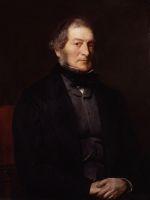 1st Baron Taunton, Henry Labouchere was born on 15 Aug 1797 in Over Stowey, Somerset; was christened on 04 Sep 1797 in St. Marylebone, Westminster, London (son of Peter Caesar Labouchere and Dorothy Elizabeth Baring); died on 13 Jul 1869 in His House, Belgrave-square, London; was buried on 20 Jul 1869 in St. Peter & St. Paul, Over Stowey, Somerset.
1st Baron Taunton, Henry Labouchere was born on 15 Aug 1797 in Over Stowey, Somerset; was christened on 04 Sep 1797 in St. Marylebone, Westminster, London (son of Peter Caesar Labouchere and Dorothy Elizabeth Baring); died on 13 Jul 1869 in His House, Belgrave-square, London; was buried on 20 Jul 1869 in St. Peter & St. Paul, Over Stowey, Somerset. Notes:
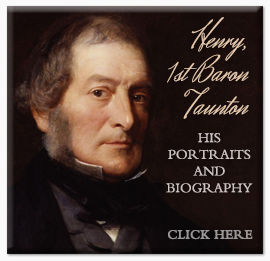
Henry married Frances "Fanny" Baring on 10 Apr 1840 in St. Marylebone, Westminster, London. Frances (daughter of Thomas Baring and Mary Ursula Sealy) was born on 23 Aug 1813 in Stratton Park, Micheldever, Hampshire; was christened on 20 Sep 1813 in East Stratton, Hampshire; died on 25 May 1850 in Kent, England; was buried on 31 May 1850 in St. Giles, Stoke Poges, Buckinghamshire, England. [Group Sheet] [Family Chart]
7. 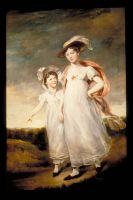 Frances "Fanny" Baring was born on 23 Aug 1813 in Stratton Park, Micheldever, Hampshire; was christened on 20 Sep 1813 in East Stratton, Hampshire (daughter of Thomas Baring and Mary Ursula Sealy); died on 25 May 1850 in Kent, England; was buried on 31 May 1850 in St. Giles, Stoke Poges, Buckinghamshire, England.
Frances "Fanny" Baring was born on 23 Aug 1813 in Stratton Park, Micheldever, Hampshire; was christened on 20 Sep 1813 in East Stratton, Hampshire (daughter of Thomas Baring and Mary Ursula Sealy); died on 25 May 1850 in Kent, England; was buried on 31 May 1850 in St. Giles, Stoke Poges, Buckinghamshire, England. Notes:
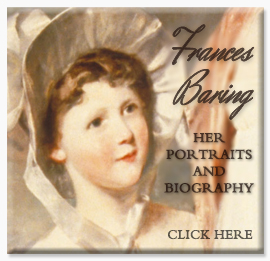
Notes:
Married:
--- "Dublin Morning Register" 03 Feb 1840, page 4:
We understand a marriage is on the tapis between the youngest and only unmarried daughter of Sir Thomas Baring, Bart., of Stratton-park, near Winchester, and the Right Hon. H. Labouchere, M.P. for Taunton. The ceremony is expected to be solemnized very shortly.
--- "The Globe" 13 Apr 1840, page 3:
MARRIAGE IN HIGH LIFE. -- The marriage between the Right Hon. Henry Labouchere, the President of the Board of Trade, and his cousin, Miss Fanny Baring, was solemnised by special license in the drawing room of Mr. T. Baring's mansion, in Devonshire-place, on Friday morning, in the presence of Lord and Lady Ashburton, the Chancellor of the Exchequer, the Hon. Major and Lady Aug. Baring, Mr. John Labouchere, and other relatives of the parties. The bride and bridegroom, after the ceremony, set off in a travelling chariot and four for the delightful villa of the Right Hon. Poulett Thomson at Roehampton, where they will pass the honeymoon.
--- "Taunton Courier" 15 Apr 1840, page 3:
By special licence, on the 10th inst. the Right Hon. Henry Labouchere, M.P. to Frances, youngest daughter of Sir Thomas Baring, Bart. of Stratton Park.Children:
- 3. Mary Dorothy Labouchere was born on 22 May 1842 in Belgrave-square, London; was christened on 20 Jun 1842 in St. Peter's, Pimlico, London; died on 15 Mar 1920; was buried in Over Stowey, West Somerset.
- Mina Frances Labouchere was born on 23 Jun 1843 in Belgrave-square, London; was christened on 16 Sep 1843 in St. Nicholas, Chislehurst, Kent; died on 04 Sep 1917; was buried in Englefield Green Cemetery, Surrey.
- Countess St. Germans, Emily Harriet Labouchere was born on 24 Jun 1844 in Datchet, Buckinghamshire; was christened on 01 Aug 1844 in Datchet, Buckinghamshire; died on 18 Oct 1933 in Penmadown House, St. Germans, Cornwall; was buried on 21 Oct 1933 in Eliot Family Plot, St. Germans, Cornwall, England.
- Stillborn Baby Labouchere was born on 25 May 1850 in Chislehurst, Kent; died on 25 May 1850 in Chislehurst, Kent.
Generation: 4
12. 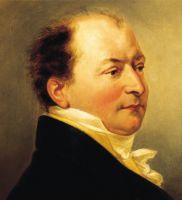 Peter Caesar Labouchere was born in 1772 in The Hague, The Netherlands (son of Matthieu de Labouchere and Marie-Madeleine Moliere); died on 11 Jan 1839 in Hylands, near Chelmsford, Essex; was buried on 28 Jan 1839 in St. Peter & St. Paul, Over Stowey, Somerset.
Peter Caesar Labouchere was born in 1772 in The Hague, The Netherlands (son of Matthieu de Labouchere and Marie-Madeleine Moliere); died on 11 Jan 1839 in Hylands, near Chelmsford, Essex; was buried on 28 Jan 1839 in St. Peter & St. Paul, Over Stowey, Somerset. Notes:
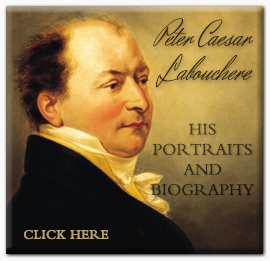
Peter married Dorothy Elizabeth Baring on 26 Nov 1796 in St. Mary's, Beddington, Surrey. Dorothy (daughter of Francis Baring and Harriet Herring) was born on 13 Feb 1771 in London, England; was christened on 14 Mar 1771 in St Gabriel, Fenchurch, London; died on 15 May 1859 in London. [Group Sheet] [Family Chart]
13. Dorothy Elizabeth Baring was born on 13 Feb 1771 in London, England; was christened on 14 Mar 1771 in St Gabriel, Fenchurch, London (daughter of Francis Baring and Harriet Herring); died on 15 May 1859 in London. Notes:
--- "Bridgwater Mercury" 04 May 1859, page 3:
TAUNTON ELECTION.
The nomination of candidates to represent this borough in Parliament having been appointed to take place on Friday, a considerable number of persons assembled on the Parade . . . Unfortunately, however, Mr. Labouchere had been called to town the day before to attend the sick-bed of a parent, who it was feared was near death; and in consquence he was not present.
--- "Shepton Mallet Journal" 06 May 1859, page 4:
TAUNTON.
Borough Election. -- The nomination here took place on Friday. Mr. Labouchere, one of the old members, was unable to be present, having been summoned to London on the previous day in consquence of the sudden illness of his mother.
--- "Bridgwater Mercury" 25 May 1859, page 8:
We are sorry to hear that Mrs. Labouchere, mother of the Right Hon. H. Labouchere, died on Sunday last, at her residence, in Upper Grosvenor-street, London. It will be remembered that the illness of his parent was the cause of Mr. Labouchere's absence from the hustings at the late Parliamentary election for this borough. The deceased lady had reached the venerable age of 89 years.Children:
- 6. 1st Baron Taunton, Henry Labouchere was born on 15 Aug 1797 in Over Stowey, Somerset; was christened on 04 Sep 1797 in St. Marylebone, Westminster, London; died on 13 Jul 1869 in His House, Belgrave-square, London; was buried on 20 Jul 1869 in St. Peter & St. Paul, Over Stowey, Somerset.
- John Peter Labouchere was born on 15 Aug 1798; was christened on 13 Sep 1798 in St. Marylebone, Westminster, London.
14. Thomas Baring was born on 12 Jun 1772; was christened in in St. Margaret's, Pattens, London (son of Francis Baring and Harriet Herring); died on 03 Apr 1848. Notes:
--- "The Star" 25 Jun 1813, page 2:
Sir Thomas Baring, Bart. has returned to the mild air of Malvern, in Worcestershire, for the benefit of his health.
--- "The Examiner" 08 Apr 1848, page 7:
Sir Thomas Baring, Bart., whose name for years has been so well known in commercial circles, expired on the 3rd inst., at his seat, Stratton park, Winchester, after a lengthened and severe illness, in the seventy-sixth year of his age.
--- "The Gentleman's Magazine" July 1848, page 91:
Sir Thomas Baring, Bart.
April 3. At Stratton Park, near Winchester, aged 75, Sir Thomas Baring, the second Bart. of Larkbear, co. Devon (1793), a Deputy Lieut. of Hampshire.
Sir Thomas Baring was born on the 12th of June, 1772, the eldest son of Sir Francis Baring, a Devonshire gentleman, who founded the London branch of the family, by Henrietta, daughter of William Herring, esq. of Croydon, and co-heir of Thomas Herring, Archbishop of Canterbury.
He was the eldest of five brothers; of whom the two next, Lord Ashburton and henry Baring, esq. are both commemorated in our present Obituary; William died in 1820, and George, the youngest, is still living.
Sir Thomas Baring succeeded to the baronetcy on the death of his father Sept. 12, 1810. He was best known for his fine taste in art, and his magnificent collection of pictures: which have, since his death, been brought to sale at the rooms of Messrs. Christie and Manson.
He never entered much into political affairs. He sat in Parliament for Wycombe in the parliaments of 1830 and 1831; but RESIgned his seat in the latter, before its dissolution in 1832, to Colonel the Hon. C. Grey.
Sir Thomas Baring married, at Calcutta, in 1794, Mary Ursula, eldest daughter of Charles Sealy, esq. of Calcutta, barrister at law; and by that lady, who died on the 16th July, 1846, he had issue four sons and three daughters. The former are
1. the Right Hon. Francis Thornhill Baring, late Chancellor of the Exchequer, and M.P. for Portsmouth, who has succeeded to the dignity of a Baronet; he married, first, in 1825, Jane, fourth daughter of the late Hon. Sir George Grey, Bart. and secondly, in 1841, Lady Arabella Geogina Howard, second daughter of Kenneth-Alexander first Earl of Effingham;
2. Thomas Baring, esq. M.P. for Huntingdon, and now head of the London house, who is unmarried;
3. John Baring, esq. of Oakwood, Sussex, who married, in 1842, Charlotte-Amelia, eldest daughter of the Rev. George Porcher, of Maiden Erleigh, Bucks, who died in 1846; and
4. the Rev. Charles Baring, who married, first, in 1830 . . . [mistakenly prints the name of Mary Ursula Sealy]; and secondly, in 1846, his cousin Caroline, daughter of the late Thomas Read Kemp, esq. of Dale Park, Sussex (by Frances, daughter of Sir Frances Baring, Bart.).
The daughters are:
Charlotte, married in 1833 to H.G. Wells, esq.;
Emily, married in 1837 to the Rev. William Maxwell Du Pre, Vicar of Wooburn, Bucks; and
Frances, married in 1840 to her cousin the Right Hon. Henry Labouchere, M.P. (son of Peter Caesar Labouchere, esq. by Dorothy-Elizabeth, fourth daughter of Sir Francis Baring, Bart.) now President of the Board of Trade, who has just purchased Stoke Park, in Buckinghamshire, from mr. Granville Penn, for 62,000 pounds and is about to erect a gallery for the many choice pictures which he already possesses.
--- "Thomas George, Earl of Northbrook, G.C.S.I.: A Memoir" by Sir Bernard Mallet, 1908, page 265:
HIS PICTURES.
Of these indoor interests the first undoubtedly was the arrangement and cataloguing of his great collection of pictures, most of them inherited [as noted above p. 141] from his uncle, Mr. Thomas Baring. The following extract from a description given of these pictures in the Times on Lord Northbrook's death brings out the point that the taste for pictures was a family trait of the Barings. The writer remakred that the Northbrook collection offered a "very interesting example of the way in which the great English collections were formed in teh golden age of picture buying which followed the French Revolution and the Great War, and which may be said to have lasted up to 1850. It may be said that the Barings have always been buyers of choice pictures. The Ashburton collection with its splendid Rembrandts and its fine cabinet works of the Dutch school is one instance of the connoisseurship of the family." But with Lord Northbrook the love of pictures was a more personal matter than this extract would indicate. Though he can hardly be said to have possessed what is known as the "artistic temperament," he was a lover of all beautiful things, and as we have seen himself an exellent draughtsman. The possession of these pictures was a constant and daily delight to him, their lighting and hanging a perpetual interest, and he enjoyed few things more than showing them to an appreciative visitor. He devoted much time to the compilation, in consultation with various high authorities, of catalogues which are models of what such volumes can be. The London pictures are illustrated by photographs, and the Stratton collection by small sketches of the principal pictures, more than one from his own hand and others by his daughter and his son-in-law, Colonel Crichton. In the introduction written by himself Lord Northbrook states that the collection was, "with very few exeptions, made by Mr. Thomas Baring. As the second son of Sir Thomas Baring he had been brought up in familiarity with good pictures, for his grandfather, Sir Francis Baring, acquired a fine collection of Dutch masters at the end of the 18th Century. On the death of Sir Francis in 1810 his son Sir Thomas parted with the Dutch collection to the Prince Regent, and formed a gallery mainly composed of Italian pictures. Afterwards he added to it some works by English and Dutch master.Thomas married Mary Ursula Sealy on 13 Sep 1794 in Calcutta, India. Mary was born about 1774; died on 26 Jul 1846 in Stratton Park, Micheldever, Hampshire; was buried in Micheldever, Hampshire, England. [Group Sheet] [Family Chart]
15. Mary Ursula Sealy was born about 1774; died on 26 Jul 1846 in Stratton Park, Micheldever, Hampshire; was buried in Micheldever, Hampshire, England. Children:
- Francis Thornhill Baring was born on 20 Apr 1796; was christened on 12 Jun 1796 in Fort William, Calcutta; died on 06 Sep 1866.
- Thomas Baring was born on 07 Sep 1799; died on 18 Nov 1873.
- John Baring was born on 14 Sep 1801; was christened on 05 Apr 1802 in St. Peter Le Poer, London; died on 17 Apr 1888 in Oakwood, Parish of Funtington, Sussex; was buried on 23 Apr 1888 in St. Marylebone, Westminster, London.
- Mary Ursula Baring was born on 28 Sep 1803; was christened on 02 Nov 1803 in St. Margaret's, Lee Terrace, Lewisham, Kent; died on 03 Oct 1812; was buried on 09 Oct 1812 in Micheldever, Hampshire, England.
- Charlotte Baring was born on 29 May 1805; was christened on 08 Jan 1806 in St. Marylebone, Westminster, London; died on 23 Apr 1871 in Winchester, Hampshire.
- Charles Baring was born on 11 Jan 1807; was christened on 26 Mar 1808 in St. Marylebone, Westminster, London; died on 16 Sep 1879; was buried on 19 Sep 1879 in St. Mary's, Wimbledon, Surrey.
- Emily Baring was born on 29 Dec 1808; was christened on 03 Feb 1809 in St. Marylebone, Westminster, London; died in 1883.
- Lydia Dorothy Baring was born on 25 Dec 1810 in Brighton, Sussex; died on 01 Dec 1812; was buried in Micheldever, Hampshire, England.
- 7. Frances "Fanny" Baring was born on 23 Aug 1813 in Stratton Park, Micheldever, Hampshire; was christened on 20 Sep 1813 in East Stratton, Hampshire; died on 25 May 1850 in Kent, England; was buried on 31 May 1850 in St. Giles, Stoke Poges, Buckinghamshire, England.
